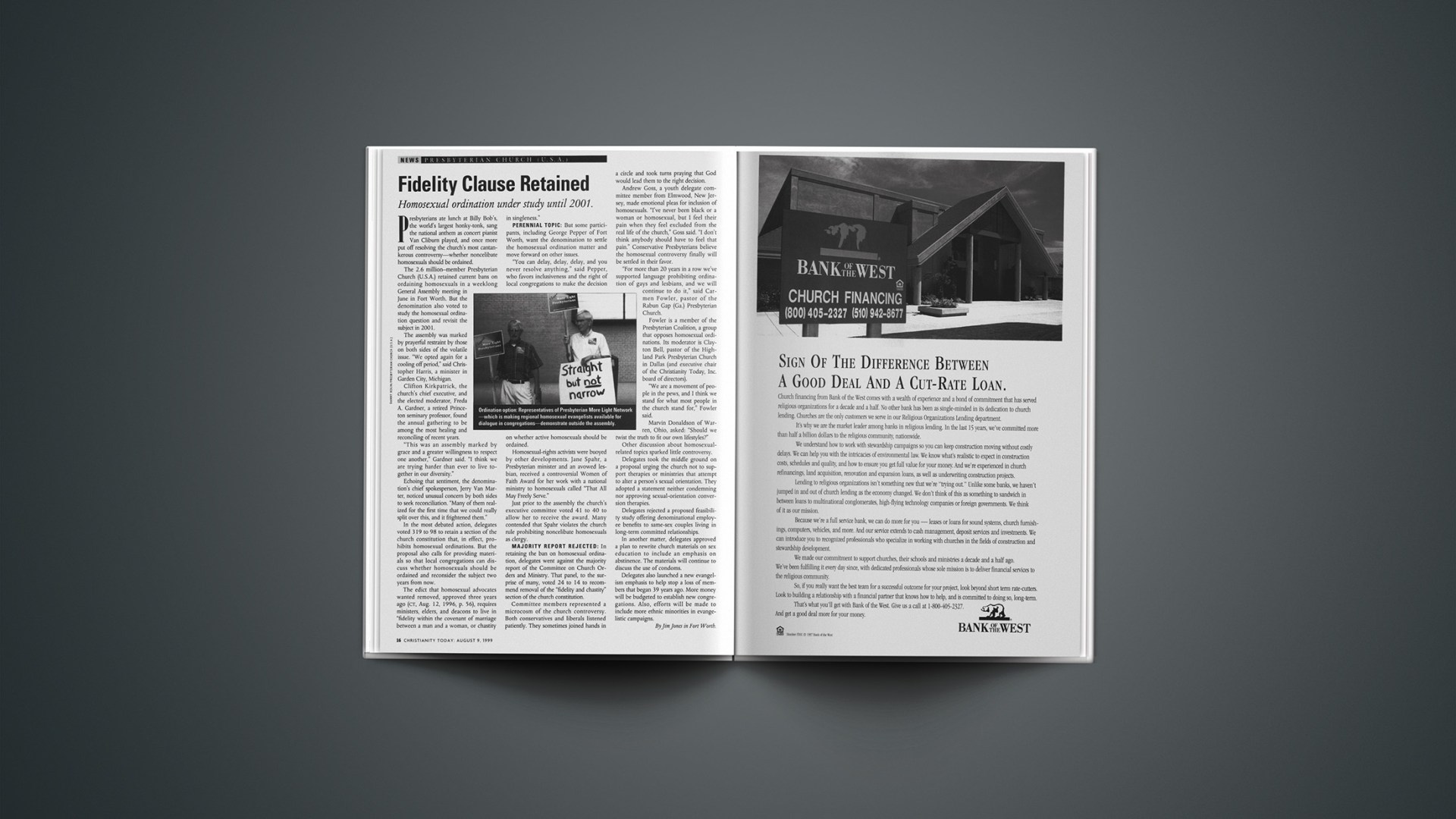Presbyterians ate lunch at Billy Bob’s, the world’s largest honky-tonk, sang the national anthem as concert pianist Van Cliburn played, and once more put off resolving the church’s most cantankerous controversy—whether non celibate homosexuals should be ordained.
The 2.6 millionmember Presbyterian Church (U.S.A.) retained current bans on ordaining homosexuals in a weeklong General Assembly meeting in June in Fort Worth. But the denomination also voted to study the homosexual ordination question and revisit the subject in 2001.
The assembly was marked by prayerful restraint by those on both sides of the volatile issue. “We opted again for a cooling off period,” said Christopher Harris, a minister in Garden City, Michigan.
Clifton Kirkpatrick, the church’s chief executive, and the elected moderator, Freda A. Gardner, a retired Prince ton seminary professor, found the annual gathering to be among the most healing and reconciling of recent years.
“This was an assembly marked by grace and a greater willingness to respect one another,” Gardner said. “I think we are trying harder than ever to live together in our diversity.”
Echoing that sentiment, the denomination’s chief spokesperson, Jerry Van Marter, noticed unusual concern by both sides to seek reconciliation. “Many of them realized for the first time that we could really split over this, and it frightened them.”
In the most debated action, delegates voted 319 to 98 to retain a section of the church constitution that, in effect, prohibits homosexual ordinations. But the proposal also calls for providing materials so that local congregations can discuss whether homosexuals should be ordained and reconsider the subject two years from now.
The edict that homosexual advocates wanted removed, approved three years ago (CT, Aug. 12, 1996, p. 56), requires ministers, elders, and deacons to live in “fidelity within the covenant of marriage between a man and a woman, or chastity in singleness.”
PERENNIAL TOPIC: But some participants, including George Pepper of Fort Worth, want the denomination to settle the homosexual ordination matter and move forward on other issues.
“You can delay, delay, delay, and you never resolve anything,” said Pepper, who favors inclusiveness and the right of local congregations to make the decision on whether active homosexuals should be ordained.
Homosexual-rights activists were buoyed by other developments. Jane Spahr, a Presbyterian minister and an avowed lesbian, received a controversial Women of Faith Award for her work with a national ministry to homosexuals called “That All May Freely Serve.”
Just prior to the assembly the church’s executive committee voted 41 to 40 to allow her to receive the award. Many contended that Spahr violates the church rule prohibiting noncelibate homosexuals as clergy.
MAJORITY REPORTED REJECTED: In retaining the ban on homosexual ordination, delegates went against the majority report of the Committee on Church Orders and Ministry. That panel, to the surprise of many, voted 24 to 14 to recommend removal of the “fidelity and chastity” section of the church constitution.
Committee members represented a microcosm of the church controversy. Both conservatives and liberals listened patiently. They sometimes joined hands in a circle and took turns praying that God would lead them to the right decision.
Andrew Goss, a youth delegate committee member from Elmwood, New Jersey, made emotional pleas for inclusion of homosexuals. “I’ve never been black or a woman or homosexual, but I feel their pain when they feel excluded from the real life of the church,” Goss said. “I don’t think anybody should have to feel that pain.” Conservative Presbyterians believe the homosexual controversy finally will be settled in their favor.
“For more than 20 years in a row we’ve supported language prohibiting ordination of gays and lesbians, and we will continue to do it,” said Car men Fowler, pastor of the Rabun Gap (Ga.) Presbyterian Church.
Fowler is a member of the Presbyterian Coalition, a group that opposes homosexual ordinations. Its moderator is Clay ton Bell, pastor of the High land Park Presbyterian Church in Dallas (and executive chair of the Christianity Today board of directors).
“We are a movement of people in the pews, and I think we stand for what most people in the church stand for,” Fowler said.
Marvin Donaldson of Warren, Ohio, asked: “Should we twist the truth to fit our own life styles?”
Other discussion about homosexual-related topics sparked little controversy.
Delegates took the middle ground on a proposal urging the church not to support therapies or ministries that attempt to alter a person’s sexual orientation. They adopted a statement neither condemning nor approving sexual-orientation conversion therapies.
Delegates rejected a proposed feasibility study offering denominational employee benefits to same-sex couples living in long-term committed relationships.
In another matter, delegates approved a plan to rewrite church materials on sex education to include an emphasis on abstinence. The materials will continue to discuss the use of condoms.
Delegates also launched a new evangelism emphasis to help stop a loss of members that began 39 years ago. More money will be budgeted to establish new congregations. Also, efforts will be made to include more ethnic minorities in evangelistic campaigns.
Copyright © 1999 Christianity Today. Click for reprint information.









